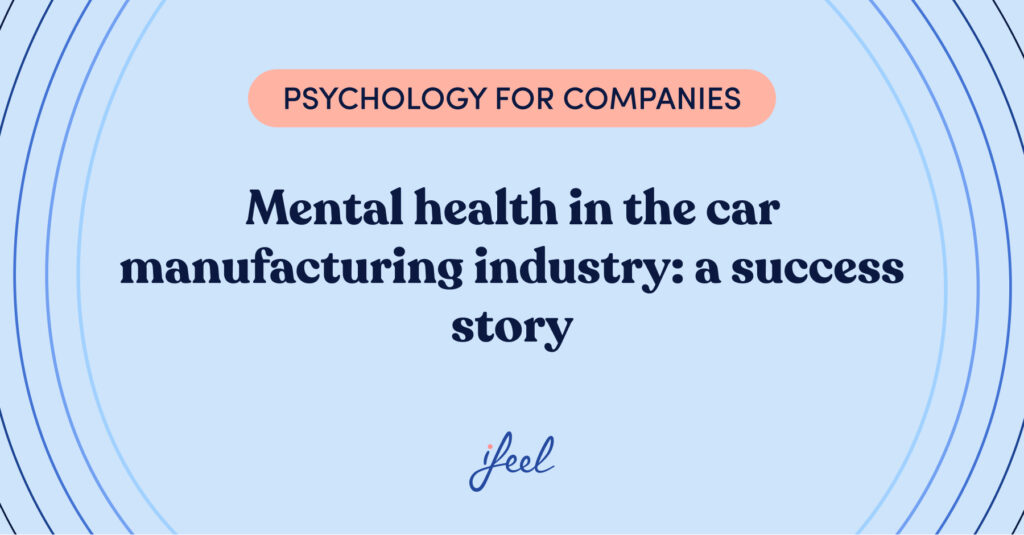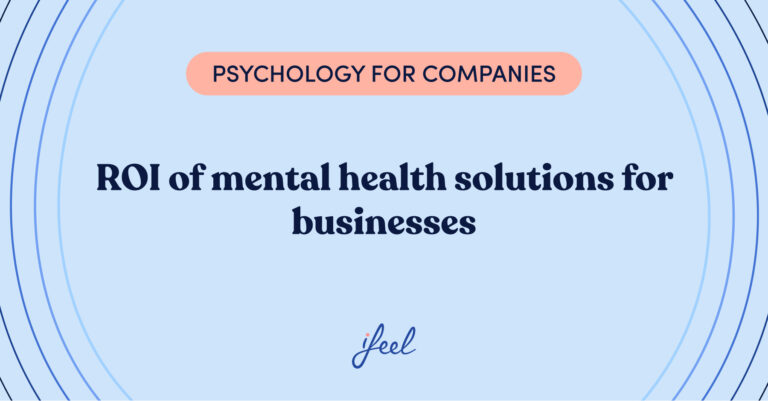The car manufacturing industry is a key driver of the global economy, characterised by high competitiveness, constant innovation and demanding productivity levels. However, behind every vehicle produced, there are thousands of workers facing physical and emotional challenges that, if not managed properly, can negatively impact their well-being and, ultimately, business results.
In this context, caring for the mental health of employees in the car manufacturing industry is not only an ethical issue, but also a crucial business strategy. In this article, we will explore why mental health should be a priority in the automotive industry and how solutions such as those offered by ifeel can make a difference.
For more information, we invite you to download our latest case study, which details and demonstrates the positive impact of implementing comprehensive solutions such as ifeel in the automotive industry.
The challenge of mental health in the car manufacturing industry
According to internal data from ifeel, around 30% of sick leave in Europe is related to mental health issues, which has a significant impact on productivity and business costs.
And the car manufacturing industry is no exception. This industry has unique characteristics that make it a high-pressure environment for employees. Among the main risk factors for mental health in this sector are:
1. High levels of stress and market demands:
Both factory workers and office workers in the car manufacturing industry face constant challenges, such as tight deadlines, high production targets and the constant need to adapt to technological advances. Added to this is the highly competitive nature of the market and the rapid transition to more sustainable technologies, such as electric and autonomous vehicles, which often causes anxiety among employees concerned about job security or a lack of up-to-date skills.
Furthermore, factors such as long working hours, rotating shifts and limited work-life balance intensify physical and mental exhaustion, negatively impacting staff performance and motivation.
2. Presenteeism and burnout:
In work cultures such as Germany, where long hours are the norm, many employees go to work even when their mental health is poor, affecting their performance and well-being. This phenomenon, known as presenteeism, not only reduces productivity but also increases the risk of long-term burnout.
3. The stigma surrounding mental health:
Another significant challenge is the stigma associated with mental health, which often prevents employees from seeking help when they need it. In an industry traditionally focused on technical performance, attention to well-being has not always been a priority. However, this reality is gradually changing, with greater recognition of the importance of mental health in the workplace.
4. Mental workload:
Studies show that in the manufacturing context of the automotive industry, mental workload is closely related to the job role and job characteristics of employees. Technicians, for example, perceive higher levels of mental workload due to the pace of work and the health consequences.
This not only affects the quality of life and professional development of workers, but also has a direct impact on the company, reflected in higher levels of absenteeism, staff turnover and a decline in product quality.
5. Traditional solutions are insufficient:
Typically, these problems have been addressed through Employee Assistance Programmes (EAPs) or social benefits, which, although useful, are often reactive and do not address the root causes of stress and demotivation. These initiatives only intervene when problems have already escalated, leaving long-term mental health challenges unresolved.
The success story: Transforming mental health at a leading automotive company
A clear example of how to address these challenges can be found in the case of a leading automotive company with 7,500 employees in Germany, the United Kingdom, France and Spain.
This organisation was facing high levels of absenteeism and presenteeism, especially among its operators, who represented 67.5% of the workforce.
The problem
Traditional solutions, such as EAPs and occasional chats with psychologists, failed to resolve the deeply rooted problems. As a result, despite efforts, employees continued to face chronic stress, demotivation and burnout, which negatively impacted productivity and overall morale.
The solution: Partnering with ifeel
The company decided to implement an innovative and proactive solution with ifeel, a leader in personalised, data-driven mental health solutions. This approach included:
- Real-time visibility: Dynamic dashboards that allowed HR teams to monitor employee mental health and make informed decisions.
- Predictive analytics: Early identification of employees at risk, especially in high-pressure roles, enabling the design of personalised and timely interventions.
- Workshops and training: More than 50 workshops on stress management, emotional resilience and mindfulness, aimed at both operators and managers.
Results
The results were transformative for the financial health of this company:
- Financial savings: In the first year, the company saved €2.77 million thanks to reduced absenteeism and presenteeism. Cumulative savings of up to €11 million per year are expected over the next three years.
- Improved talent retention: Turnover decreased significantly, especially in high-risk roles, and employee engagement increased by 30%.
- Cultural change: Mental health is no longer a taboo subject, creating an inclusive and supportive environment where employees feel supported.
If you would like to learn more about this success story and discover how ifeel can help you transform your organisation’s mental health strategy, we invite you to download our full case study here.
Investing in mental health: a smart business strategy
Mental health not only impacts employee well-being, but also a company’s financial results. According to data from ifeel, proactively addressing mental health can generate savings of up to €45,000 per high-risk case. In addition, companies that prioritise the emotional well-being of their teams tend to experience:
| Benefit | Business Impact |
|---|---|
| Reduced absenteeism | Fewer days off, greater continuity in operations. |
| Increased productivity | Motivated and committed employees perform better and more efficiently. |
| Improved retention | Reduced costs associated with hiring and training new employees. |
| Positive cultural change | An inclusive and empathetic work environment improves the company’s reputation as an employer. |
ifeel: The comprehensive solution for corporate mental health
ifeel offers a 360º solution designed to address the specific challenges of each organisation. Its main features include:
- Real-time diagnosis: Quick and accurate identification of employees at risk.
- Personalised plans: Therapy tailored to the level of risk (low, medium or high).
- Measurable impact: Reduction in costs associated with absenteeism and turnover.
- Training and workshops: More than 50 original workshops led by clinical psychologists.
In addition, ifeel integrates easily with existing wellness strategies, ensuring a positive impact on both employees and corporate culture.
Discover how to transform your company with ifeel
The experience of this leading automotive company demonstrates that investing in mental health is not a luxury, but a necessity in a competitive business environment.
If you would like to learn more about this success story and discover how ifeel can help you transform your organisation’s mental health strategy, we invite you to download our full case study.
Download the case study here
Don’t wait any longer to take the next step towards a healthier, more productive and sustainable work environment. Discover today how ifeel can make a difference in your company!







